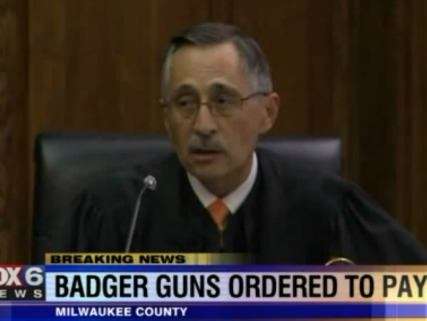Jury Says Gun Store Should Pay $5 Million for Selling Straw Buyer a Pistol
A teenager used the gun to shoot two police officers.

In 2009 a Milwaukee teenager named Julius Burton wanted to buy a handgun, but at 18 he was not old enough to legally purchase one from a federally licensed firearms dealer. So when he went to Badger Guns in West Milwaukee, he brought a 21-year-old friend, Jacob Collins, who posed as the buyer, paying $414 for a .40-caliber Taurus pistol. A month later Burton used the gun to shoot two police officers, Bryan Norberg and Graham Kunisch, in the head. Yesterday a Milwaukee jury decided that Badger Guns should pay $5.1 million in damages to Norberg and Kunisch because it was negligent in ignoring signs that Collins was a straw buyer.
Milwaukee Mayor Tom Barrett said he believed the verdict was "the first time that a retailer has been held liable" for injuries caused by a gun it sold. "I want gun dealers to be on notice that they have a responsibility," he added.
While it was illegal for Badger Arms, as a federally licensed dealer, to sell Burton a handgun given his age, both state and federal law allowed him to own one. Furthermore, federal law allows private sales of handguns to 18-year-olds. So if Collins had gone into Badger Guns alone and bought the pistol, he could have legally sold it to Burton later (assuming he cared about such niceties), and there would have been no grounds to blame the store for failing to turn Collins away. Although Barrett hopes the outcome of this case will encourage licensed dealers to be more careful about screening out straw buyers, the upshot could merely be to make straw buyers more circumspect.
The verdict, which includes $730,000 in punitive damages, arguably falls under exceptions to the Protection of Lawful Commerce in Arms Act, a 2005 federal law that bans lawsuits based on "the harm solely caused by the criminal or unlawful misuse of firearm products or ammunition products by others when the product functioned as designed and intended." The law allows tort claims based on "negligent entrustment"—i.e., "the supplying of [firearms] by a seller for use by another person when the seller knows, or reasonably should know, the person to whom the product is supplied is likely to, and does, use the product in a manner involving unreasonable risk of physical injury to the person or others." It also allows claims based on "an action in which a manufacturer or seller…knowingly violated a State or Federal statute applicable to the sale or marketing of the product."
The two officers injured by Burton, one of whom lost an eye and suffered permanent brain damage, argued that employees of Badger Guns knew or reasonably should have known he was the real buyer of the Taurus pistol. Burton hovered near Collins during the purchase, and surveillance video shows him pointing at a gun, saying, "That's the one that I want." When Collins filled out the federal form for the purchase, he checked a box indicating that he was buying the gun for someone else. He changed his answer when a clerk pointed out that it was inconsistent with what he had said on the state form. After Collins realized he did not have enough cash in his pocket to pay for the gun, he left the store with Burton and came back with more money. Burton, who is serving an 80-year prison sentence, testified on video that no one at the store asked him any questions or checked his ID, although there was a sign saying entry was limited to people 21 or older.
The jurors, who deliberated for nine hours, concluded that Badger Guns should have trained its employees to question customers more aggressively in cases like this and turn away people who seem to be straw buyers. "The business practices were almost nonexistent," one juror told WISN, the ABC station in Milwaukee. "There were no policies or procedures, no training." Badger Guns plans to appeal. "We have to wait the years of appeals," Norberg and Kunisch's lawyer told WITI, the local Fox station. "Whether or not they are going to see a dime…is still open to question."
So is the broader impact on the gun industry, given the facts of the case. Claiming a gun dealer ignored obvious signs that a particular sale was illegal is worlds away from, say, claiming "negligent entrustment" based on production of "military-style" rifles that are rarely used for criminal purposes but happen to have been used in some mass shootings.


Show Comments (80)